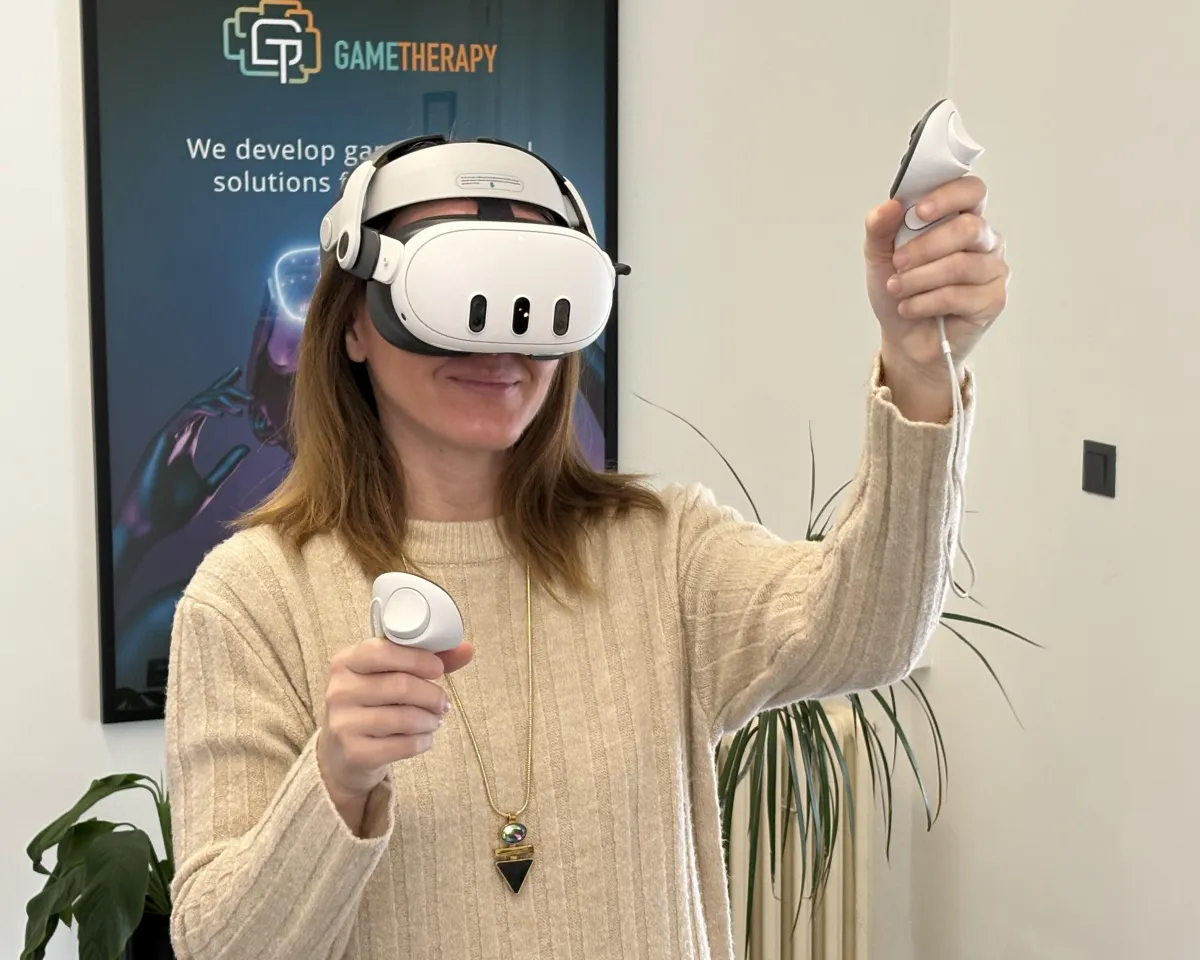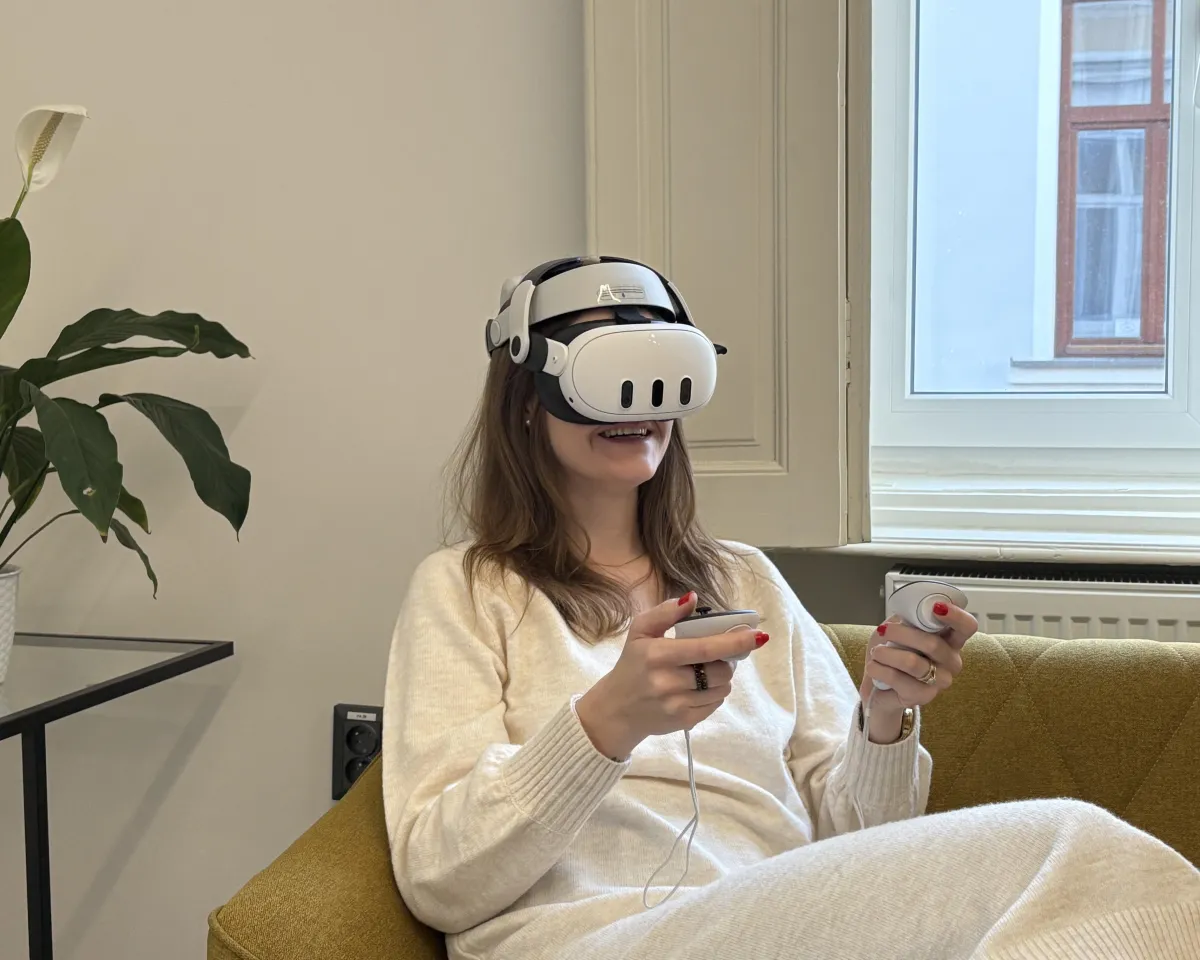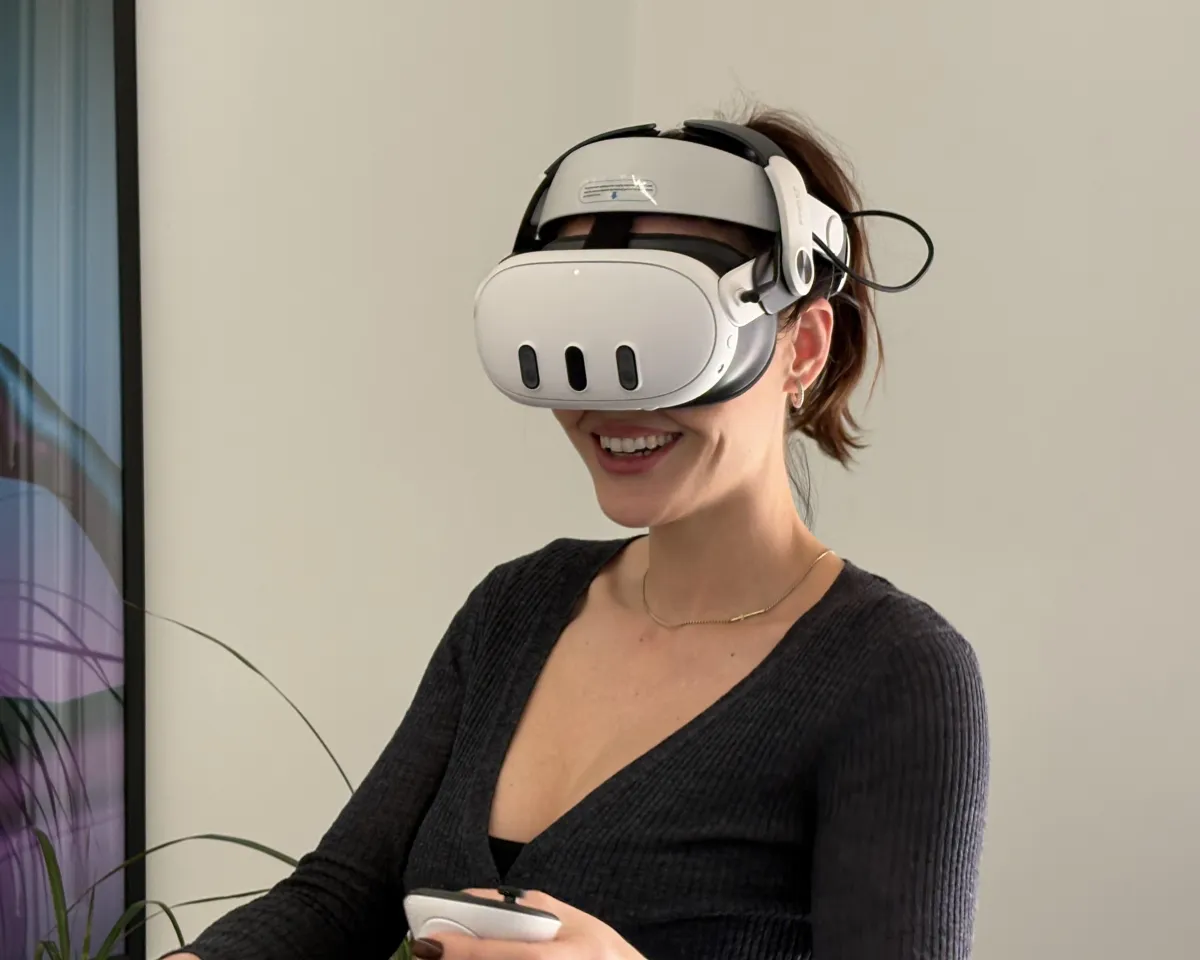BRIDGING RESEARCH, TECHNOLOGY, AND THE GAMING WORLD
Your partner in cutting-edge software development
Our mission is to transform human well-being and human-computer interaction. We do this by integrating virtual reality, augmented reality, and artificial intelligence technologies. At the heart of our philosophy is game-therapy. We create innovative, scientifically grounded, yet playful solutions for a wide range of challenges.

IMPACTFUL TOOLS FOR A BETTER QUALITY OF LIFE
Our products
ClaustrOFF
A game created with cutting-edge research to help you overcome fears in a safe, engaging, and effective way
NeuroBoostVR
Innovative exercises for seniors and others to improve motor skills, balance, and orientation with simple, effective activities
VIRADIA
Virtual Reality Platform for Early Diagnosis of Neurodegenerative Diseases, Revolutionizing Neurological Diagnostics
Experience the full power of VR for positive well-being
With a commitment to innovation and the transformative power of VR, we aim to make a lasting impact on mental health, education, industry, and personal growth, all grounded in scientific research and designed to enhance well-being worldwide.

GROWTH THROUGH INNOVATIONS
The GAMETHERAPY model
We harness the power of new technologies. By making care and training more accessible and tailored, we empower individuals and organizations to thrive. Rooted in scientific research, our innovative approach drives meaningful change, transforming mental health, education, healthcare, industry, and personal growth on a global scale.
SOLUTIONS THAT MAKE AN IMPACT
Immersive solutions for mental health and beyond
Our primary focus is on creating immersive applications that empower individuals to overcome challenges like anxiety, phobias, and neurological conditions. These solutions are designed to enhance well-being and unlock potential across various aspects of life, showcasing our expertise in innovative and impactful technologies.
Engaging VR/AR solutions for soft skills training
Evaluation in neurology and rehabilitation
General education
Personal development
Industrial training
Industry 5.0 applications

Join the Mind Heaven Community!
Be part of our journey to transform mental health care and well-being through innovation and gamification. By signing up, you’ll gain access to exclusive psychological content, enjoy discounts on our products, and stay updated with the latest news about our projects. You’ll also discover unique content like game stories and behind-the-scenes insights into our app development process. We value your ideas and feedback to make our games even better. Join us, become a co-creator, and help shape the future of the Mind Heaven Community!

Understanding Anxiety Triggers and How to Overcome Them
Understanding Anxiety Triggers and How to Overcome Them: A Science-Backed Guide

Anxiety can feel overwhelming, but understanding your anxiety triggers is the first step to managing it. Knowing what causes your anxiety can help you find effective ways to cope and build resilience. In this guide, we’ll look at common anxiety triggers, explore the science behind them, and offer practical tips on how to overcome them, supported by insights from scientific studies. - Dr. Martin Polák
What Are Anxiety Triggers?
An anxiety trigger is anything that can cause feelings of fear, worry, or nervousness. These triggers are unique to each person, but research shows that certain situations and experiences are more likely to spark anxiety. Identifying your triggers is a powerful tool that allows you to take control and work on reducing your anxiety.
Common Anxiety Triggers
According to research, some of the most common anxiety triggers include:
Social Situations: Interacting with others, especially in unfamiliar or crowded settings, can be a significant trigger for those with social anxiety .
Health Concerns: Physical symptoms, illnesses, or even the thought of getting sick can be a major cause of anxiety .
Financial Stress: Worries about money and finances can easily lead to feelings of panic and stress .
Work and School Pressures: Deadlines, performance expectations, and workload are all well-known anxiety triggers .
Past Trauma: People who have experienced trauma may feel anxious in situations that remind them of their past experiences .
Each of these triggers can lead to a heightened response in the brain, often causing symptoms like rapid heartbeat, sweating, and difficulty concentrating.
Why Do Anxiety Triggers Affect Us?
Anxiety triggers are closely linked to the fight-or-flight response, a survival mechanism that prepares the body to respond to perceived threats. When faced with a trigger, the brain releases chemicals like adrenaline and cortisol, which create physical symptoms associated with anxiety. According to studies, this response can become overly sensitive, leading to chronic anxiety even in non-threatening situations .
How to Identify Your Personal Anxiety Triggers
To manage anxiety effectively, it’s essential to pinpoint your specific triggers. Here are some steps you can take to identify them:
Keep a Journal: Write down situations when you feel anxious. Note where you are, what’s happening, and any physical sensations you experience.
Look for Patterns: After a few weeks, review your notes to identify any recurring situations or thoughts that trigger your anxiety.
Rate Your Anxiety Levels: Rate your anxiety on a scale from 1-10 each time you feel anxious. This can help you identify the intensity of different triggers.
Strategies to Overcome Anxiety Triggers
Now that you know your triggers, let’s look at some evidence-based strategies to help you manage and overcome them.
1. Practice Mindfulness
Mindfulness is a technique that helps you stay present and grounded, reducing your mind’s tendency to worry about the past or future. Studies show that practicing mindfulness can reduce anxiety by helping you focus on the here and now .
How to Get Started: Begin with simple breathing exercises, focusing on each breath as it comes in and goes out. Apps like Headspace or Calm can be great resources for mindfulness exercises.
2. Challenge Negative Thoughts
Cognitive Behavioral Therapy (CBT) is one of the most effective therapies for anxiety, and it works by helping you challenge negative thoughts. Research shows that CBT can significantly reduce anxiety symptoms by enabling individuals to identify and challenge unrealistic thoughts .
Example: If a social situation triggers anxiety, ask yourself, “What’s the worst that can happen?” Often, you’ll realize that the likelihood of your fear coming true is low.
3. Exposure Therapy
Exposure therapy is another science-backed method for overcoming anxiety triggers. This approach involves gradually facing your fears in controlled, manageable steps. Studies indicate that exposure therapy can help people reduce their emotional response to triggers over time .
How It Works: For example, if you’re afraid of social situations, you might start by talking to a friend, then gradually work up to speaking in small groups.
4. Develop a Self-Care Routine
Taking care of your mental and physical health can help you manage anxiety more effectively. Regular exercise, a balanced diet, and sufficient sleep are all proven to reduce anxiety symptoms .
Exercise: Physical activity releases endorphins, which are natural mood lifters. Research suggests that even a 30-minute walk each day can significantly reduce anxiety levels .
Healthy Diet: Foods rich in omega-3 fatty acids, like salmon and walnuts, have been shown to reduce anxiety symptoms .
Sleep: Aim for 7-9 hours of sleep per night. Poor sleep can worsen anxiety, so creating a calming bedtime routine is essential .
5. Seek Support
Anxiety can feel isolating, but you’re not alone. Support from friends, family, or a mental health professional can make a big difference. Studies show that therapy, support groups, and talking openly with people you trust can help you develop a stronger support system .
Final Thoughts on Managing Anxiety Triggers
Learning to manage anxiety triggers is a journey, and it’s okay to take small steps. Start by understanding what triggers your anxiety, and then use these science-backed techniques to reduce its impact on your life. With time and practice, you’ll find that you can navigate situations that once felt overwhelming.
By incorporating these practices into your daily life, you’re building resilience against anxiety triggers and creating a healthier, more balanced lifestyle. Remember, progress takes time, so be patient with yourself as you work toward a life with less anxiety.
References
Aldao, A., Nolen-Hoeksema, S., & Schweizer, S. (2010). Emotion-regulation strategies across psychopathology: A meta-analytic review. Clinical Psychology Review, 30(2), 217-237.
Hofmann, S. G., Asnaani, A., Vonk, I. J., Sawyer, A. T., & Fang, A. (2012). The efficacy of cognitive behavioral therapy: A review of meta-analyses. Cognitive Therapy and Research, 36(5), 427-440.
American Psychological Association. (2017). Clinical practice guideline for the treatment of posttraumatic stress disorder.
Khoury, B., Lecomte, T., Fortin, G., Masse, M., Therien, P., Bouchard, V., ... & Hofmann, S. G. (2013). Mindfulness-based therapy: A comprehensive meta-analysis. Clinical Psychology Review, 33(6), 763-771.
Meuret, A. E., Wolitzky-Taylor, K. B., Twohig, M. P., & Craske, M. G. (2012). Coping skills training for the treatment of anxiety disorders: A systematic review and meta-analysis. Behavior Therapy, 43(2), 272-284.
Cuijpers, P., van Straten, A., & Warmerdam, L. (2007). Behavioral activation treatments of depression: A meta-analysis. Clinical Psychology Review, 27(3), 318-326.
Hallion, L. S., & Ruscio, A. M. (2011). A meta-analysis of the effect of cognitive bias modification on anxiety and depression. Psychological Bulletin, 137(6), 940.






